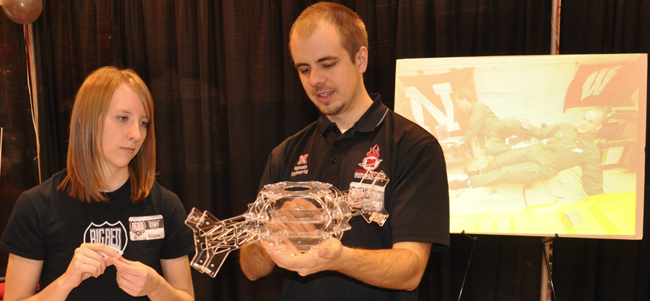
Members of the UNL Microgravity University team are making final preparations with their "octo-copter" flying experiment this week before leaving for Texas to test the low-gravity flying device out during NASA's Flight Week.
Seven students will venture to Johnson Space Center in Houston to conduct experiments aboard reduced-gravity aircraft beginning July 29. The UNL Microgravity University team's final prep session, in the lab where they've worked for more than six months, will put the experimental copter through its final maneuvers.
The Microgravity U. program engages selected college and university teams in scientific research that helps our nation's space program to refine its efforts. Projects are conducted during a series of parabolic reduced-gravity flights in specially-equipped aircraft that reach 35,000 feet above the earth's surface.
The team will arrive on July 25 at Ellington Field near Houston. They will then go through required training and safety briefs before flying their experiment, which will evaluate the ability of the Active Response Gravity Offload System to provide a microgravity environment for a free-flying vehicle.
ARGOS is a robotic system that provides reduced-gravity environments through a large, motion-based platform. This facility, at NASA's Johnson Space Center, has been used for human and robotic testing for the past three years. However, it has not yet been used for testing free flyers.
UNL’s team developed the octo-copter to fly a specific set of motion patterns in both ARGOS and plane-induced microgravity environments. The team also devised a related data-collection method, including motion capture camera system and inertial guidance unit aspects. Flight Week's parabolic flight maneuvers should allow collection of data for comparison to the data collected with ARGOS at the Space Center. This work will help allow ARGOS’ control system to be tuned for optimal free-flyer performance.
“The team's opportunity to participate is the result of hard work and commitment," said Carl Nelson, associate professor of mechanical and materials engineering. UNL’s team was selected from more than 30 proposals for the Systems Engineering Educational Discovery, or SEED, flight program based on scientific merit and educational outreach potential.
Students who will fly on the zero-gravity aircraft include Caleb Berggren, senior mechanical and materials enginering major from Blair; Tricia Foley, junior electrical engineering major from Blair; Eric Fritz, senior mechanical and materials engineering major from Atkinson; and Jake Reher, senior mechanical and materials engineering major from Omaha. Three students will serve as alternates or ground crew: Nicholas Goeser, senior mechanical and materials engineering major from Omaha; Ethan Monhollon, junior biochemistry major from Roca; and Blake Stewart, sophomore mechanical and materials engineering major from Bellevue.
Nelson and Dustin Dam, a UNL microgravity alumnus and a co-adviser for the 2013 team, will also travel with the team to Houston.
For more information on Microgravity University, go to http://microgravity.unl.edu; http://reducedgravity.jsc.nasa.gov and https://microgravityuniversity.jsc.nasa.gov/se/.
-- Carole Wilbeck
More details at: http://go.unl.edu/2qo